As full-time travelers, we take a lot of transportation, live in multiple apartments, eat out at restaurants, shop at markets, taste new snacks, and enjoy exploring our beautiful planet. Since we explore much more than the average person, our impact on the environment is very much a concern for us.
In the article, we will be sharing tips on how we reduce our impact on the environment that we apply while we travel but many tips you can easily apply at home. While we are nowhere near perfect zero-waste, we aspire towards it and are improving our ways every day. Everyone’s daily action can drastically make a difference because we only have one beautiful planet earth and we need to take care of her!
Some links to the products mentioned below are affiliate links, meaning that if you click and make a purchase, Nomad Numbers may receive a commission at no additional cost to you. For more information please review our disclaimer page.
Tip #1 – Apply eco-friendly best practices that you would at home
These are basic best practices but they are worth remembering for people that aren’t familiar with them:
- Switch off electricity at night. We like to turn off the wifi router, TV and other appliances before we go to bed. Not only does this reduce electricity consumption but you get less radiation from EMF emitting devices
- Turn off the faucet when brushing your teeth or taking a shower.
- Make use of natural light as much as possible. Not only does artificial light use energy, but it is also bad for you due to the blue light they emit.
- Store information digitally and opt-in for digital mail. Since we sold most of our possessions, we digitize everything and opt-in for all communications, like bank statements, to be digital.
- Close the blinds before leaving your apartment, especially if you leave early in the morning. You will appreciate finding a cool place once you return.
- Use a pressure cooker – they cook in half the time and use way less energy.
- Turn off the lights, A/C, and other nonmandatory appliances while leaving your home, apartment or hotel.
Tip #2 – Carry a Zero Waste Kit
As we shared in Mrs. NN carry on packing list for long-term travel, we travel with a Zero Waste Kit. It might not be the first thing you think to pack in your limited space but it is one of the most used items we carry with us. This kit is currently made of the following articles:
- One foldable grocery bag – very handy for groceries or an additional bag to carry items in transit. Folds up very small and I always keep it on me
- Premium Reusable Mesh Produce Bags with Tare Weight Tags – We do a lot of grocery shopping and we aim to use zero plastic bags. These have been super handy for fruits and vegetables.
- Vremi Silicone Food Storage Containers with BPA Free Airtight Plastic Lids – This kit comes with 4 collapsible containers of different sizes. They are a great way to reduce our footprint when we need to pack our food on the go. They can double as great storage containers too. We took the two biggest ones and each of us carries on.
- Handkerchief Cloth – to use instead of napkins and tissues.
- Set of bamboo chopsticks + fork + spoon + knife + straw – We broke the previous kit that was gifted to us, so we were quite happy to find one during our stay in Bali back in March (similar to this reusable bamboo kit).
- Simple Modern Wave Water Bottle – This water bottle is insulated so it can keep water hot (for 10 hours!) or cold (for 24 hours). We use the 17 oz capacity but you can get up to 34 oz if needed.
- Hydration Pack Waterproof – We put this in my backpack when we go hiking. It can store up to 3 liters, which is usually plenty for a full day.
- Reusable water bottle – We bought this secondhand and added to the collection recently because we found we wanted to get juices a lot and I wanted to avoid using plastic cups.
- We also pack spice containers that we refill when we run low
- Sea Salt + Turmeric + Black Pepper
Here is what our zero waste kit looks like put together
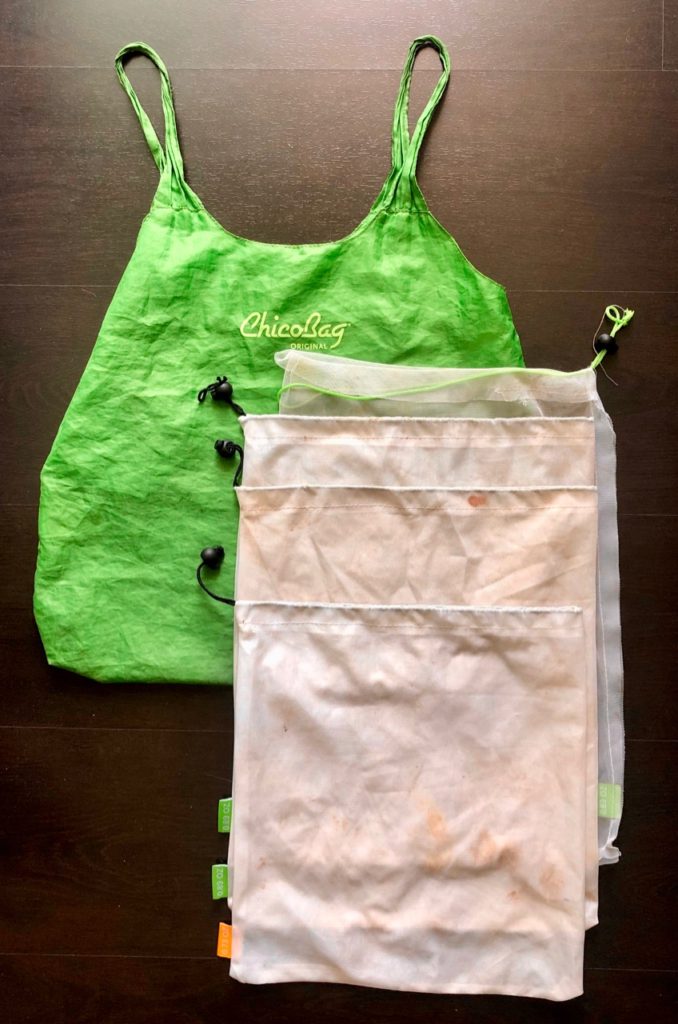
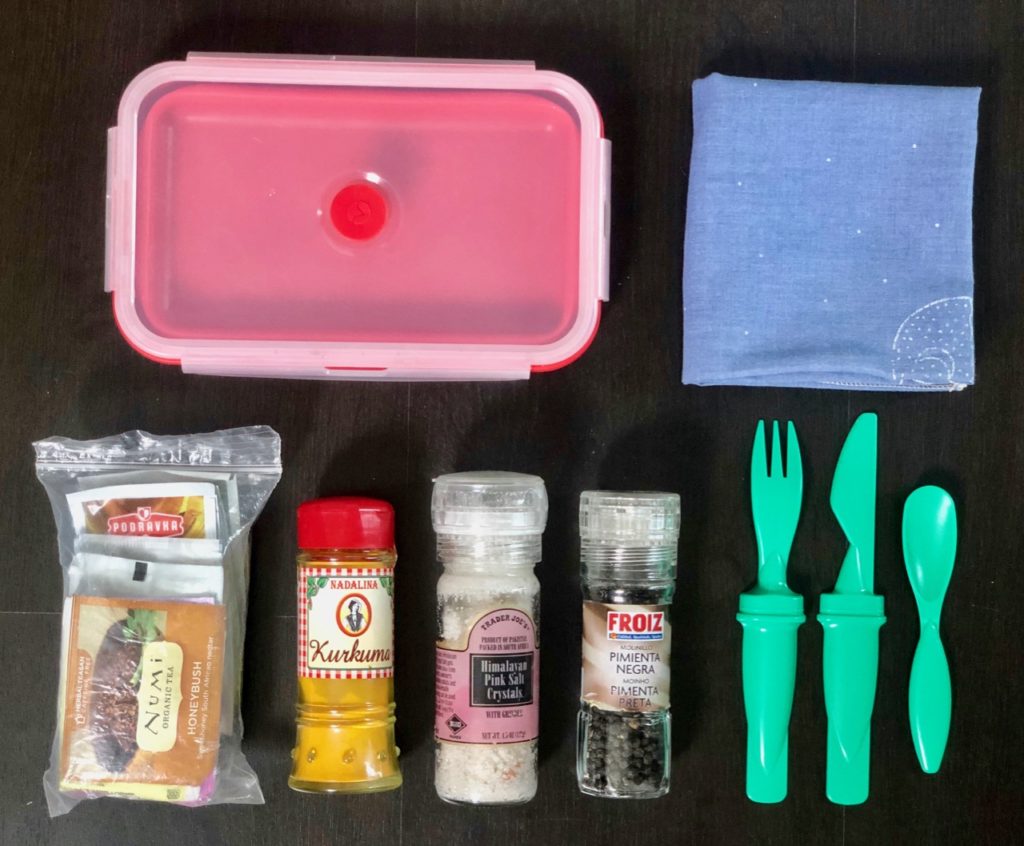
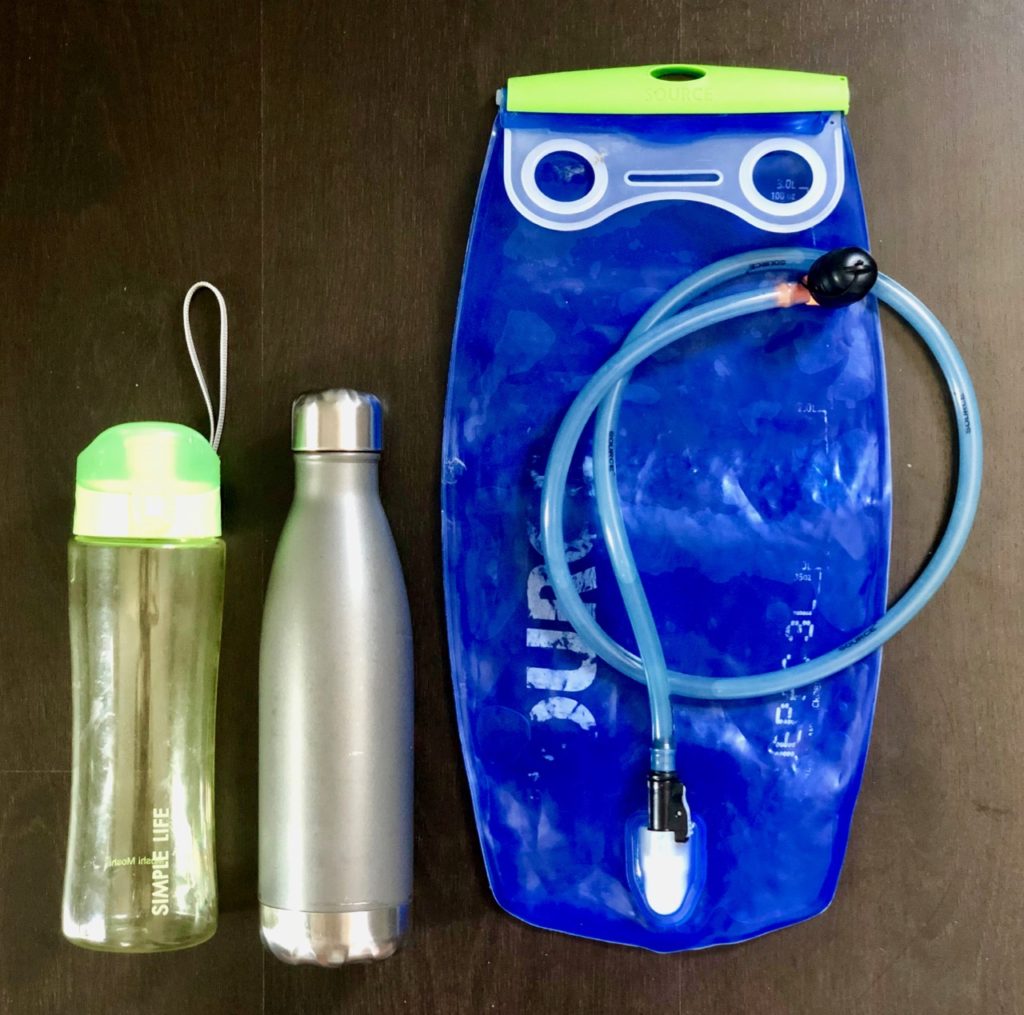
Tip #3 – Practice bulk shopping
We like to go to zero waste stores or bulk stores where we can bring our own reusable container to purchase products. Every country has a different level of awareness about the environmental impact of plastic and other non-reusable materials so we aren’t always able to find these stores.
We have been able to find bulk or zero-waste stores in Montreal, San Francisco, Lisbon, Porto, Chiang Mai, Da Nang, Bali, and Taipei but we were having trouble doing the same in places like Puerto Vallarta, Oaxaca City, San Miguel de Allende, Aruba, and Kotor.
As you can see, not every country is equal when it comes to zero waste stores and bulk grocery shopping. Our best alternative is usually to go to the local farmers market (instead of mainstream grocery stores).
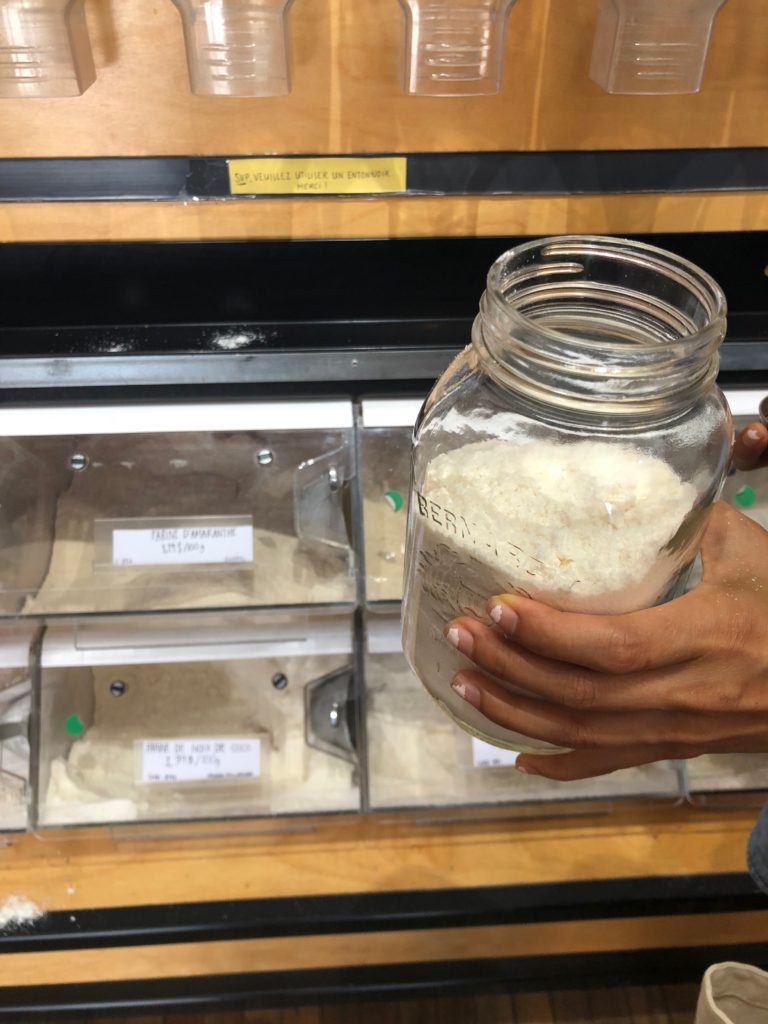
Tip #4 – Say No to plastic
While our Zero Waste Kit helps us reduce our plastic usage, we often see products that come pre-packaged in plastic (Thailand is exceptionally good at that unfortunately). We will often check if the vendor has the product unpackaged available and use our reusable bag or we will simply walk away from buying it and look for a different vendor. We say no to plastic as much as we can but are definitely not perfect in this area, many of the grocery store products we buy do have some plastic packaging but we do what we can.
Tip #5 – Volunteer for beach cleanups or trash pickups
We have been on a few beach cleanups since we’ve visited a bunch of islands over the past year. This is a good way for us to give back to the beautiful places that we have enjoyed. For example in Koh Lipe, in half a day with about 15 people, we managed to pick up a few tons of waste. This was quite impressive to see how much trash is in the oceans, beaches, and islands – definitely a huge turn off from using plastic. A great organization to volunteer for beach and environment cleanups is Trash Hero.
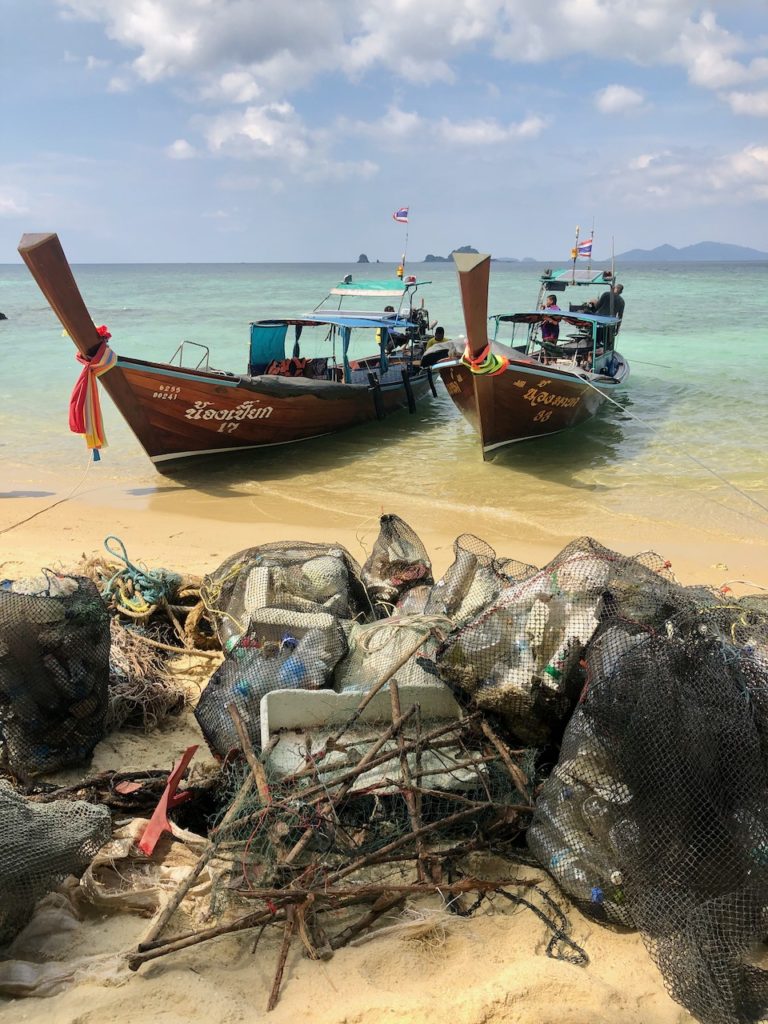
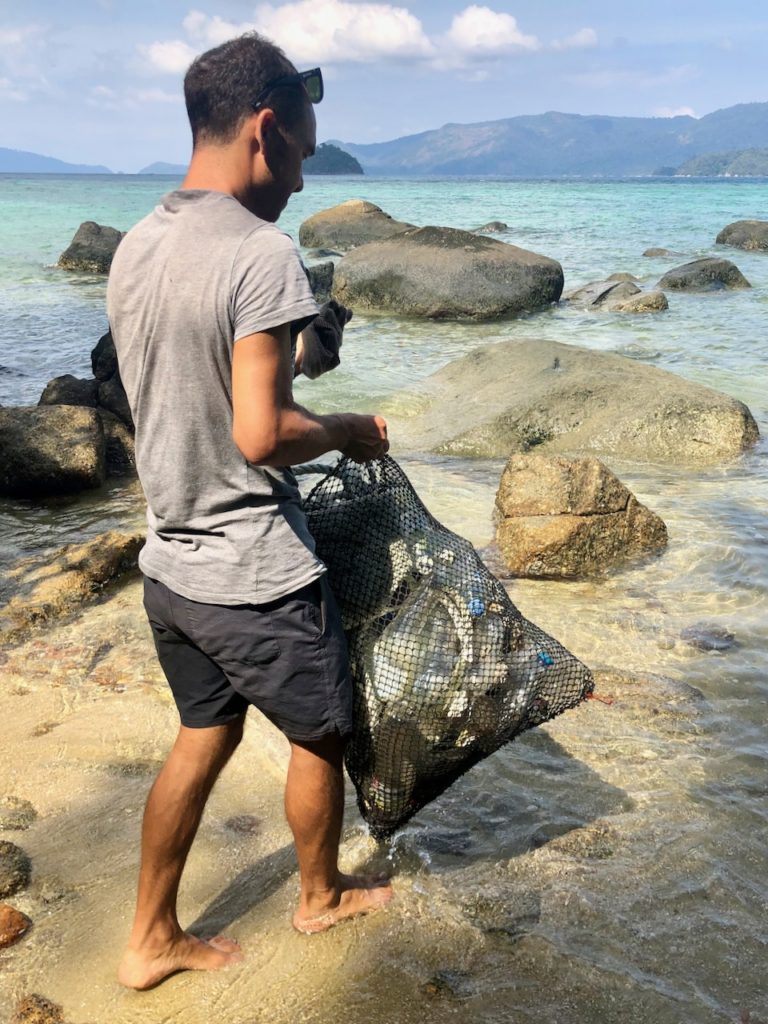
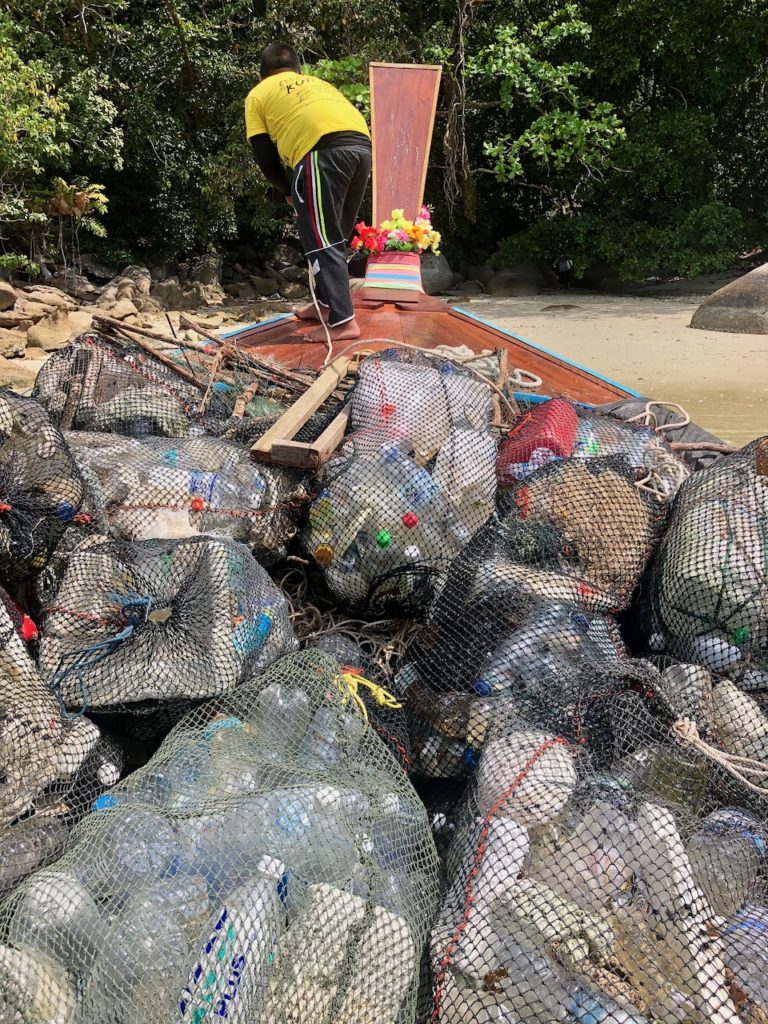
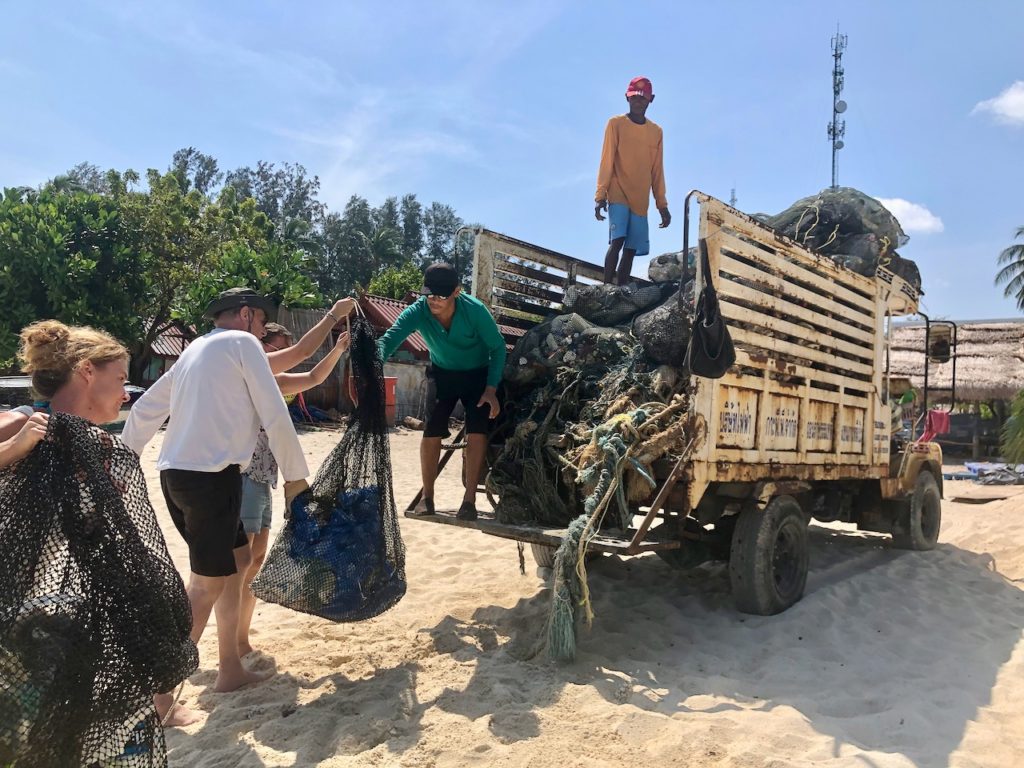
In Taiwan, where we are currently staying as we are writing this post, we did a beach cleanup with a smaller group and collected around 400kg of trash. During the cleaning on FuLong beach, the organizer likes to read the label of plastic bottles to see where they come from and many arrive from foreign countries by the current.
While we still have a long way to go, we try to share what we do on this blog or with the people we meet along the way. We have opportunities to show off our zero waste kit when we go on hikes or do our grocery shopping and they make for great conversation starters. We are surprised that only a few travelers come as prepared as we are so we hope we can inspire some small habit changes.
We also hope that this blog can help inspire you to think about some small habit changes to reduce waste! (Don’t forget to subscribe to our newsletter to receive our future blog posts and get some exclusive content).
Tip #7 – Walk or use public transportation to get around
This one is pretty easy for us since we don’t own a car but even before our nomadic life, we also did not own one and really enjoyed using public transportation (train, bus) or ride-sharing services. Our default local transportation method is walking as it is always a great way to stay active.
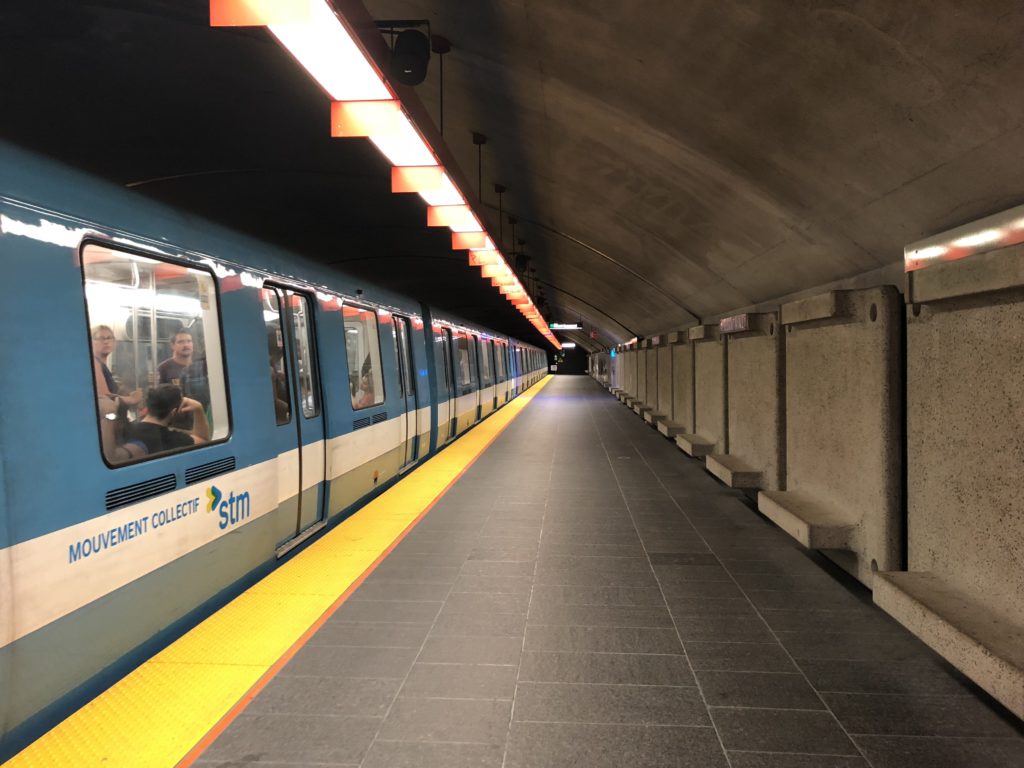
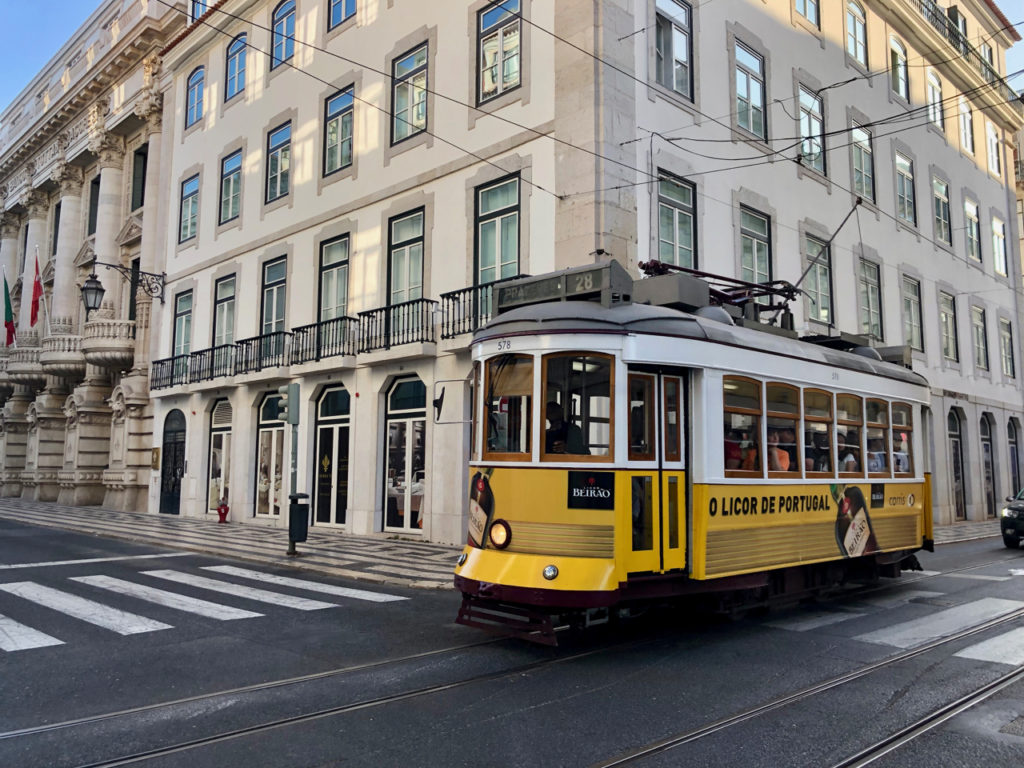
Tip #8 – Slow down
By not needing to rush your way to many sites, you reduce your transportation usage significantly, which is another advantage of slow travel. Also if you’re not in a hurry, you can choose to take a train instead of a flight. You also stay in the same place for a longer period of time, which reduces the amount of one-time usage or convenience items.
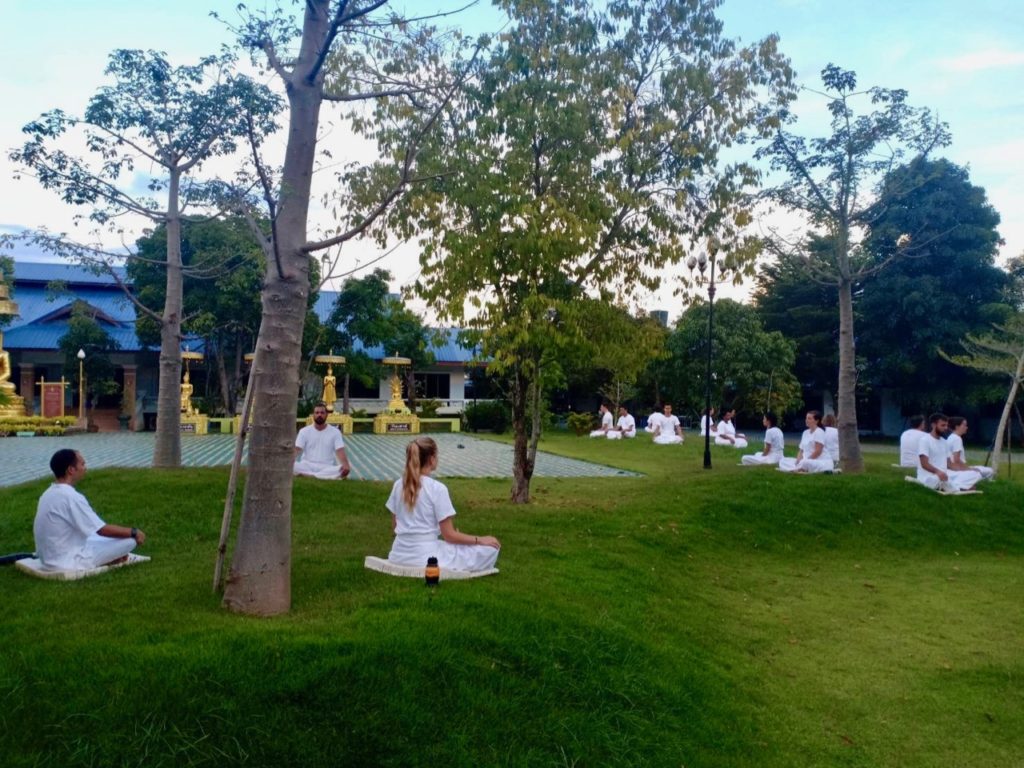
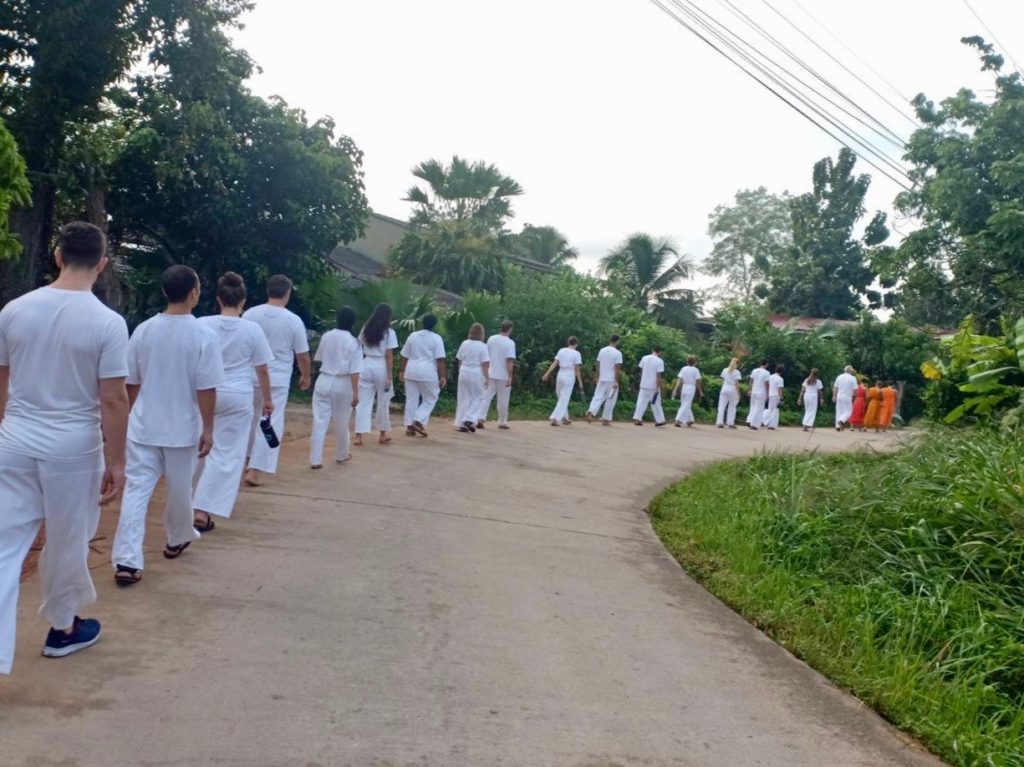
Tip #9 – Reduce flying
OK, this one is a biggie because we know that the carbon emissions from an airplane flight have one of the biggest impacts on the environment. As nomads, we admittedly travel and fly much more than the average person. We are aware of this, are very thoughtful about our decisions, and do what we can by practicing slow travel, living as minimalists, not owning a car, cooking most of our meals, and adopting the principles we mentioned above.
We also prefer long bus rides over quick flights when visiting a given country (as we did in Malaysia recently to go from Langkawi to Cameron Highlands to Kuala Lumpur) or currently in Taiwan by using the really good rail system to go around the country. It’s also a great way to discover the country by going through spectacular countrysides. And again, it’s not about perfection but about being intentional and aspiring towards zero-waste.
Tip #10 – Having fewer children
The topic we’re about to discuss can be a subject of controversy, but we believe it’s essential to consider it in the broader context of combating CO2 emissions. When it comes to children, it’s worth noting that on average, they may contribute to approximately 60 tons of CO2 emissions per year. To put this into perspective, it’s equivalent to traveling around 100,000 miles by air, which is less than the amount of air travel we experienced during our initial 5 years of nomadic travel.
So those are our tips for reducing the impact on the environment while traveling. What about you? What other tips are we missing that we should include? Please let us know by leaving a comment in the comments section below!


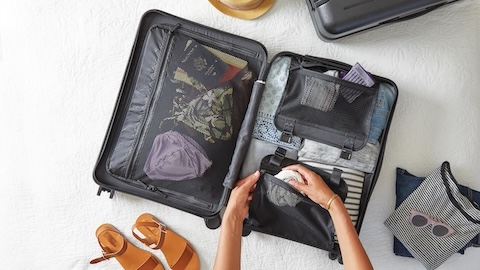
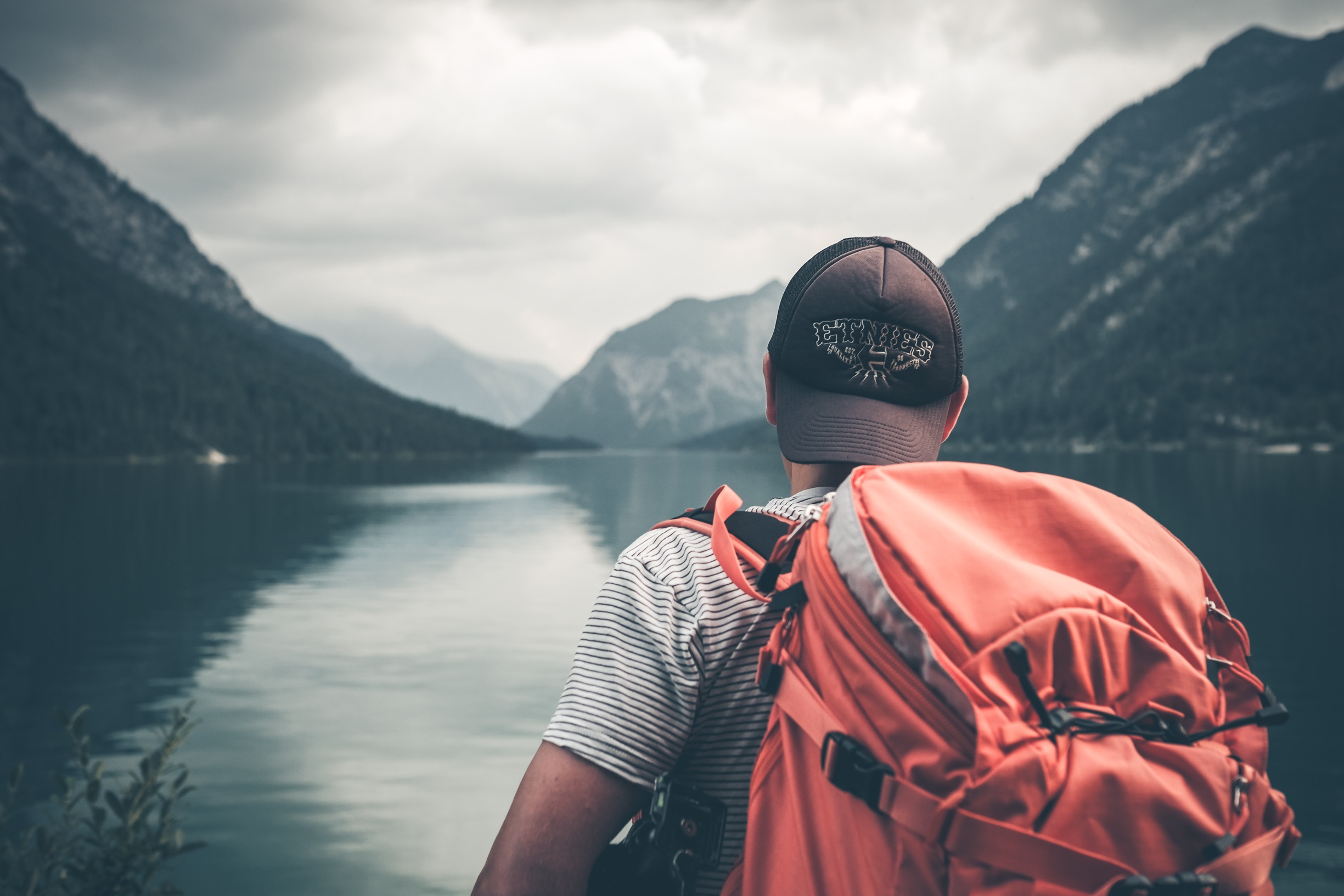
10 Comments
Kathleen · June 29, 2020 at 12:28 pm
What do you do about water for places where you shouldn’t drink the tap water?
For myself, I picked up a small filter in a hiking store in Greece and it was the best purchase I made in our 7 months away! Something like this one –
https://sawyer.com/products/mini-filter/
Mr. Nomad Numbers · June 29, 2020 at 2:35 pm
Good question! If we can’t drink the water at the tap and our appartement isn’t equipped with a proper filtration system, we either buy or get water in large quantity delivered to where we stay (usually 20L). The former is our preferred way as the company that deliver the water would reuse the water container. As for your small filter it’s something we’ve been thinking about as they do a great job a filtering a lot of chemical that some basic sanitization system doesn’t do but haven’t pulled the trigger on one yet. How long does it take to filter large quantity of water. Also do you used filtered water when cooking (if you do cook).
Ryan · June 30, 2020 at 1:29 am
These are some great tips, some that I didn’t know about. Thanks for sharing.
Mr. Nomad Numbers · June 30, 2020 at 2:01 pm
Hi Ryan. You are very welcome. What were some of our tips that surprised you the most?
Our Freedom Years · June 30, 2020 at 7:06 pm
This is a great set of tips – thanks for raising this important issue!
We try to minimise our footprint as travellers and agree that saying no to plastic (#4) can sometimes be a challenge especially when it comes to grocery shopping. Fresh markets are great but there are times we find ourselves in a supermarket with bins full of pre-wrapped veggies and we don’t have much choice.
I noticed that we are travelling with almost the exact same “zero waste” items… I will call them my “zero waste kit” from now on! One additional piece we have is a non-disposable coffee filter. We also carry a chef knife and paring knife… that has nothing to do with waste though – just good food!
Mr. Nomad Numbers · July 1, 2020 at 3:06 am
Thank you for your comment! Glad to know that you guys also also have a zero waste kit. All long term travelers should have one shouldn’t they? Not only it is super affordable, in the past 6+ months we spent in SEA it has easily saved us hundreds of disposable chopsticks, straw and plastic cups 🙂
As for supermarkets – in southeast Asia – they are probably some of the worse we’ve seen when it come to the amount of plastic they use to prepackaged fresh produce. We do miss some of the supermarket chains in the USA (like Trader Joe in California) for being much much more eco friendly. Have you guys tried going to the local farmers market instead?
As for cooking we haven’t considered carrying knifes because we travel carry-only. But yeah if you cook a chef knife should be a must have in every kitchen. Airbnb should add a filter for that 🙂
Our Freedom Years · July 1, 2020 at 1:23 pm
Haha yes having a chef knife in carry-on wouldn’t work so well! We had to give up carry-on travel when we started travelling with our dogs… checking bags is less convenient but it allows us those extra few comfort items.
Agree that farmers markets are the best… we were lucky to have one right across the street while living in Singapore so we could do all our shopping there. Now we are on the road, it’s hit or miss but we do our best.
Mr. Nomad Numbers · July 1, 2020 at 3:04 pm
And you guys are still early on in your journey. I’m sure you are gonna keep tweaking things as we’ve done on our end. It is far from being an exact science and they key is to be flexible like guys guys seems to be already 🙂
Noémie · July 1, 2020 at 1:53 pm
Thank you! Those are definitely good tips and it is so important to share this!
I would say an important tip you forgot would be a whole paragraph in itself (maybe you could at an #10?) : Reduce meat consumption, as it is one of the most important thing to do to reduce our footprint: https://www.nature.com/articles/d41586-019-02409-7
Thank you for your blog, have a nice day 🙂
Mr. Nomad Numbers · July 1, 2020 at 3:06 pm
Hi Noémie. Oh yeah that’s a great one to mention! Thanks for pointing it out.